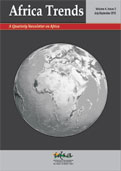Arms Trade Treaty and Africa
On April 2, 2013, the UNGA approved the draft text of the ATT- 154 countries voted for the treaty, three voted against and 23 abstained. It remains to be seen whether the treaty succeeds in fulfilling the goal of curbing violence in Africa.
- Rajiv Nayan |
- November-December 2015 |













